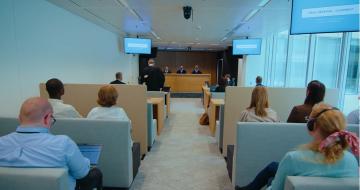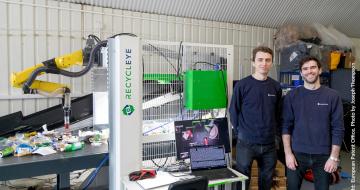As for copyright, the law provides for a series of cases in which, under certain conditions, it is not necessary to request an authorisation from the holders of related rights. Nevertheless, in some situations, the user is required to pay. These are rights to remuneration.
The exceptions apply under specific conditions. It is necessary to check if the conditions are met. Even if you believe you do not need to apply for an authorisation by virtue of an exception. If one of the conditions has not been met, the use of the work without authorisation would constitute an infringement of copyright.
Public performance and broadcasting of music
- A public performance by a performer fixed on a phonogram. Under certain conditions, it is not necessary to obtain the authorisation of the record producer to play music in a shop or a restaurant.
- The broadcasting of the performance by a performer fixed on a phonogram. Broadcasters do not have to obtain the authorisation of performers and phonogram producers to broadcast pieces of music.
However, in both cases, a remuneration should be paid to the collecting societies that manage the rights of performers and phonogram producers. Furthermore, duties should also be paid to the authors of the works via Sabam or another collecting society.
From 1 January 2020, you can request a licence to use music from the one-stop platform UNISONO, managed by Sabam, PlayRight and SIMIM. With a licence and a payment, you are covered for copyright and related rights.
Common exceptions to related rights and copyright
There are many other situations in which it is allowed to reproduce or communicate the performance of an artist, a phonogram, or a film to the public. These possible situations are identical to those for which it is not necessary to request the author's authorisation. In that case, it is possible to use artistic content without having to request the authorisation of any holder of rights on the content (author, performer, producers, etc.).
Exceptions for education and/or scientific research
The authorisations of the author, performers, or producer are not required for :
- performance citations : reproduction of extracts of protected performances for critical or educational purposes, for example in the frame of a film review show,
- the communication of performances in the frame of school activities : the broadcasting of a historic film for a history lesson,
- the reproduction and communication of performances to illustrate teaching or research : the illustration of a course with extracts of performances to which the teaching relates, for example film extracts in a film history course, is authorised. Under certain conditions, this also extends to online or distance learning.
- a performance during public examinations, with a view to obtaining a diploma.
Exceptions for libraries, museums and archives
The authorisations of the author, performers, or producer are not required for:
- consulting works on library or museum terminals : libraries may allow their visitors to consult certain works and performances protected by related rights on microfilm or in digital format on computers or any other equipment made available to them.
- copies with a view to the preservation of cultural and scientific heritage : libraries, archives or museums can restore performances or make digital copies of performances in order to preserve and conserve them for future generations;
- Orphan works, i.e. works for which the rights holder cannot be identified or located, may sometimes be used.
- Public libraries,
- educational institutions and museums,
- archives,
- repositories of cinematographic or sound heritage,
- public service broadcasters,
may under certain conditions use orphan works without requiring the authorisation of the rights holder. The purposes for which these works are intended must be stated in legislation.
These organisations must conduct a meticulous search for the rights holder. If they cannot find the latter, they must register it as an orphan work in a database.
Exceptions for private use
The authorisations of the performers or producer of the work are not required for:
- the private communication of performances : the distribution of performances in a private or family context, as well as in any context where the persons present have a close social link. For example, the diffusion of music in a retirement home for the sole benefit of the residents, is exempt from related rights. For further information on music in public.
Exceptions for information
The authorisations of the performers, or the producer are not required for:
- performance citations that serve to illustrate information about the performance in question.
- copies of their own broadcasts by broadcasting organisations even if these include performances protected by related rights.
- caricature, parody or pastiche for humorous purposes.
- news event reports on a performance: a report on a play or a film that has just opened.
Other exceptions
Other exceptions to related results mean that it is not necessary to request authorisations from performers or the producer:
- the exception for the disabled: the law authorises the reproduction of performances, their adaptation, or any other act that is necessary to allow a disabled person to access the performance, for example the adaptation of a film for the hard of hearing;
- the exception for hospitals, prisons or youth care institutions : these institutions are authorised by law to copy performances for the use of their residents;
- the exception for public lending : for educational and cultural purposes, libraries and media libraries may lend out works under certain conditions;
- the announcement of public exhibitions may be illustrated by reproductions of the performances in question;
- temporary reproductions of works : this exception allows the temporary copying of performances that takes place automatically in the digital environment, either when a performance is used by a computer or when a performance is transmitted over a network.


